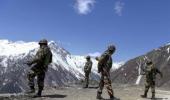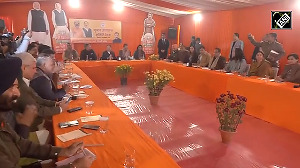India and China on Friday held 'in-depth' diplomatic talks to address the remaining issues along the Line of Actual Control (LAC) in eastern Ladakh, holding that disengagement of troops in the North and South banks of Pangong lake provided a good basis to work towards their early resolution.

The two countries also agreed during the virtual parleys that in the interim they should continue to maintain stability at ground level and prevent any untoward incident, the Ministry of External Affairs (MEA) said in a statement.
A Chinese Foreign ministry's readout of the talks said the two sides agreed to jointly maintain the 'hard-earned' peace and tranquillity in the border areas.
Both the statements said the two sides agreed to maintain close communication and dialogue through both the diplomatic and military channels and agreed to convene the 11th round of military talks at an early date.
The MEA statement said the two sides should continue their dialogue to reach a mutually acceptable solution for complete disengagement from all friction points at the earliest.
'This would enable two sides to look at broader de-escalation of troops in the area and work towards restoration of peace and tranquillity in the border areas.
'They also agreed that in the interim two sides should continue to maintain stability at ground level and prevent any untoward incident,' it added.
The Indian Army has been pitching for a faster disengagement process in areas like Hot Springs, Gogra and Depsang to bring down tension in the mountainous region.
The talks were held under the framework of the Working Mechanism for Consultation and Coordination on India-China Border Affairs (WMCC).
The MEA also said that India and China agreed that the agreement reached between the two foreign ministers in Moscow in September last as also their recent phone conversation in February should continue to guide the work of the two sides.
'The two sides reviewed the situation along the LAC in the Western sector and had in-depth discussions on the remaining issues along the LAC in the Western sector,' it said.
'They agreed that the completion of the disengagement in North and South Bank of the Pangong Lake provided a good basis for the two sides to work towards early resolution of these remaining issues.'
An English version of the press release issued by the Chinese Foreign ministry and posted by the Chinese Embassy in Delhi said the two sides had candid and in-depth exchange of views on promoting the resolution of other issues in the China-India border areas.
Both sides agreed to implement the five-point consensus reached by the Foreign Ministers at the Moscow meeting and the spirit of the phone conversation between them on February 25, to stabilize and control the border situation and 'avoid relapse', it said.
The Indian delegation was led by Naveen Srivastava, Additional Secretary (East Asia) in the MEA, while the Chinese side was headed by Hong Liang, Director General of the boundary and oceanic department of the Chinese Ministry of Foreign Affairs.
As a result of a series of military and diplomatic talks, the two countries had completed withdrawal of troops and weapons from the North and South banks of Pangong lake in line with an agreement on disengagement.
After completion of the disengagement process in Pangong lake areas, senior military commanders of India and China held another round of talks on February 20 with a focus on taking forward the disengagement process in other friction points.
In a joint statement, the two sides said they positively appraised the smooth completion of disengagement of frontline troops in the Pangong lake area.
On February 11, Defence Minister Rajnath Singh announced in Parliament that India and China reached an agreement on disengagement in the North and South banks.
The disengagement process began on February 10.
External Affairs Minister S Jaishankar and his Chinese counterpart Wang Yi reached a five-point agreement at a meeting held in Moscow on September 10 on the sidelines of a Shanghai Cooperation Organisation(SCO) conclave.
The pact included measures like quick disengagement of troops, avoiding action that could escalate tensions, adherence to all agreements and protocols on border management and steps to restore peace along the LAC.











 © 2025 Rediff.com -
© 2025 Rediff.com -